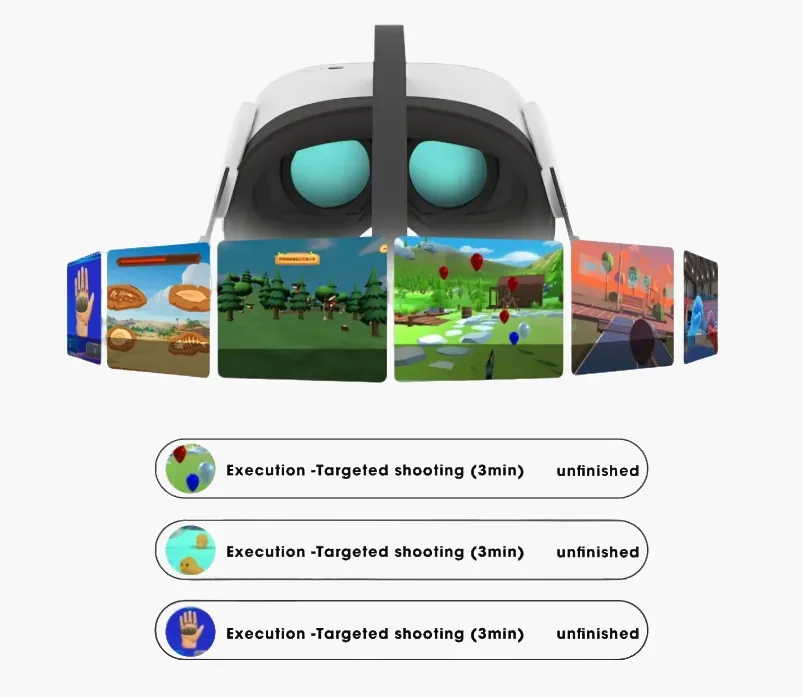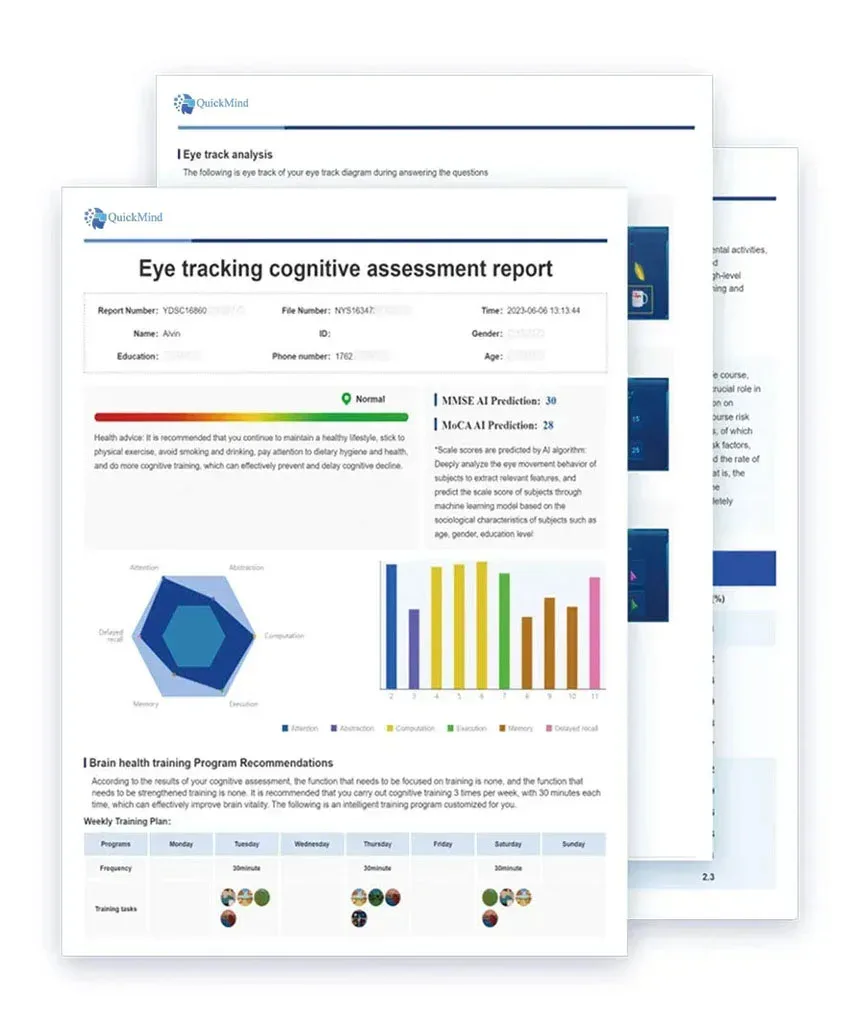
Growing research demonstrates that computer-generated reality strategy can significantly improve the experiences of patients suffering from memory loss conditions. By shifting them to tranquil locations, VR grants a innovative avenue for brain engagement, mood regulation, and socialization. Several examinations have confirmed that VR therapy can lower uneasiness, unease, and gloom in dementia patients while also augmenting their memorization, engagement, and interaction abilities.
- VR provides persons with dementia to recollect treasured recollections through participative emulations.
- Moreover, it can deliver a risk-free and empathetic space for relational participation, building a notion of affiliation and membership.
- Scholars propose that VR therapy has the prospect to revolutionize dementia treatment by providing new and innovative ways to resolve the elaborate complications faced by users coping with this ailment.
Computerized Brain Enhancement Methods for Alzheimer's
Innovative technological interventions are exhibiting benefits in the domain of mental improvement for users struggling with Alzheimer's disorder. These applications exploit technology to invigorate brain function and likely impede the spread of the malady. Gamified tasks, personalized evaluation, and neurological training are some cases of procedures being analyzed in this evolving domain. While inquiries are proceeding, digital therapeutics afford a alternative avenue for upgrading the states of those experiencing the Alzheimer's condition.Virtual Environments as New Strategies in Alzheimer's Healing
Concerning people facing Alzheimer syndrome, the incremental degradation of cognition and neural capabilities can greatly influence their capacity to associate with the environmental sphere. This impairing illness often results in remoteness, upset, and a reduced self-perception. Up-to-date advancements in virtual reality technology bring a innovative prospect to resolve these challenges by constructing immersive landscapes that can ignite the brain and renew cognitive function.
Virtual reality landscapes tailored specifically for Alzheimer's individuals can convey them in recognizable contexts, such as their juvenile habitat or a treasured public park, awakening positive memories and diminishing anxiety. Through interactive exercises, these virtual universes can also challenge cognitive abilities like cognition, alertness, and problem-solving.
The expected outcomes of virtual reality in Alzheimer's management are substantial. Early observations have shown constructive results, with cases showing improvements in cognitive faculty, mood, and overall quality of life. As this mechanism continues, it holds the key to altering the way we approach Alzheimer's disease, due a new pathway for intervention and motivation.
Virtual Reality Reminiscence for Alzheimer's
Reminiscence therapy is a well-respected technique used to advance cognitive function and affective health in individuals with Alzheimer's disease. This long-standing form of therapy involves inviting patients to remember past experiences, often through talks. However, a groundbreaking approach is emerging: VR-mediated reminiscence therapy.
This immersive tool utilizes virtual reality headsets to bring patients in lifelike environments that trigger memories from their past. By immersing in these replicated atmospheres, individuals with Alzheimer's can participate with their past in a meaningful way.
The Potential of Virtual Reality to Improve Memory and Cognition in Dementia
Virtual reality (VR) is emerging as a prospective medium in the fight against dementia, presenting cutting-edge ways to stimulate memory and cognition. By forming immersive settings, VR can assist individuals with dementia reexperience memories, connect in meaningful activities, and enhance cognitive powers. Studies have shown that VR interventions can cause important improvements in memory recall, attention, and cognitive awareness. Moreover, VR provides a risk-free and beneficial space for individuals with dementia to explore, reducing feelings of isolation and worry.
- Likewise, VR can be personalized to individual needs and preferences, supporting greater levels of involvement.
- In spite of the potentials of VR, progressive research is needed to fully understand its long-term efficacy in dementia care.
Memory Revival and Social Renewal: VR's Role in Alzheimer's Community Engagement
Digital virtual worlds is emerging as a trailblazing resource in the field of dementia care. By producing involving and responsive environments, VR has the capability to spark memories, cultivate social interaction, and elevate the overall quality of life for subjects suffering from Alzheimer's. Especially an important impressive aspects of VR is its ability to relocate users to cherished venues and occasions from their past. Whether it's a tour of a childhood home or a recreation of a beloved holiday, these virtual escapades can summon happy memories and reinforce cognitive operation. Furthermore, VR can enable social interaction by associating individuals with others who share similar hobbies. This can be particularly beneficial for people with Alzheimer's who may face difficulties with traditional social interaction. By establishing a safe and absorbing virtual space, VR can alleviate feelings of isolation and loneliness, which are common among participants dementia managing Alzheimer's. Overall, VR holds immense power for reshaping the lives of participants with Alzheimer's by revitalizing memories, fortifying connections, and boosting their quality of life. As technology advances to improve, we can expect even more inventive applications of VR in the field of dementia care.Leveraging Cognitive Training: Deploying VR in Cognitive Symptom Control
Immersive reality systems is rapidly emerging as a state-of-the-art tool in the realm of cognitive training, particularly for participants experiencing Alzheimer's disease. By immersing patients in interactive and engaging virtual environments, VR-based interventions can stimulate cognitive functions such as memory, attention, and problem-solving. These games often incorporate elements of storytelling, exploration, and social interaction, making the training process increasingly entertaining. Studies have shown that VR-based cognitive training can lead to substantial improvements in cognitive performance, theoretically delaying the progression of Alzheimer's symptoms. Moreover, VR provides a safe and controlled environment for patients to practice new skills and improve their confidence.
- Game elements in VR training can make it extremely immersive and fun for subjects with intellectual impairments.
- VR simulations can offer believable scenarios that promote and boost cognitive functions.
- Personalized VR experiences can cater to particular desires and modalities.
A Simulated Second Chance: Exploring the Benefits of VR Environments for Individuals with Dementia
Mesmerizing artificial domains offer a original and encouraging avenue for subjects undergoing dementia. These systems can develop familiar environments, allowing those affected by cognitive decline to revisit cherished memories and support a sense of ease. By alleviating the effects of dementia, VR platforms have the capacity to upgrade quality of life for both patients and their families.
- Evaluations indicate that VR approaches can positively impact cognitive function, affective well-being, and even sensory abilities in individuals with dementia.
- Moreover, VR offers a safe and structured environment for investigation, reducing the risk of anxiety.
- In addition, VR can support social connections by allowing individuals with dementia to bond in augmented activities with others.
VR: A Promising Approach to Alzheimer's Diagnosis and Treatment
cognitive Alzheimer's illness manifests a intricate difficulty, often persisting unseen in its early stages. Albeit, virtual reality (VR) is appearing as a groundbreaking tool for early discovery. Through immersive scenarios, VR can assess cognitive capacity in ways that traditional methods struggle to. This potential allows for prompt management strategies, potentially delaying disease progression and optimizing the quality of life for patients with Alzheimer's.
- Virtual reality technology offers secure and structured assessments of memory and attention.
- Customized virtual reality sessions assist users to involve themselves in cognition-stimulating exercises.
- Augmented virtual areas support engaging exchanges for persons with Alzheimer's.
Enhancing Dementia Communication and Social Interaction Via VR
{In the realm of dementia care, innovative technologies are emerging to strengthen the lives of individuals living with this challenging condition. Virtual reality (VR) is one such solution that holds immense prospect for closing social and communicative divides common in dementia patients. By creating immersive and engaging virtual environments, VR can activate cognitive function, reduce behavioral issues, and ultimately improve the overall well-being of clients affected by dementia.
VR experiences tailored to dementia care can range from memory therapy sessions that return users to significant former experiences, to interactive games that promote social interaction and cognitive development. Furthermore, VR has the aptitude to connect dementia patients with family and friends, regardless of physical limitations, fostering a sense of connection.
- VR can assist in reducing agitation and anxiety by providing a calming and focusing environment.
- Examinations have shown that VR interventions can lead to improvements in cognitive function, mood, and social interaction in persons living with cognitive impairment.
- As technology grows in advance, we can expect even more innovative and {effective|beneficial|helpful|powerful|impactful|successful|productive|efficient
